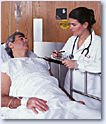How soon will you be having surgery?
 If you’ve just found out that you need surgery, then you’re probably still shaking and quaking from the news. Perhaps you expected it, but perhaps you did not! So many people have a natural fear of surgery, and especially a fear of being put to sleep or anesthetized. The chances of something going wrong are less than 1%, but if you are part of this small group, your life might be at risk. Of course, if you need surgery and don’t have it, then your life is at risk anyway.
If you’ve just found out that you need surgery, then you’re probably still shaking and quaking from the news. Perhaps you expected it, but perhaps you did not! So many people have a natural fear of surgery, and especially a fear of being put to sleep or anesthetized. The chances of something going wrong are less than 1%, but if you are part of this small group, your life might be at risk. Of course, if you need surgery and don’t have it, then your life is at risk anyway.
I was always taught that knowledge is power, so with that in mind, I want to tell you about one specific option that more and more people are turning to in order to increase the chances of a positive result and at the same time, decrease many of the dangers. This solution is so simple that many people overlook it completely, but it is so easy and safe that it is definitely worth giving a try. That solution is music! Not just any music though. The ideal music for surgery, especially if you’ll be put completely to sleep is music that is very slow and rhythmic. It is music that has the tempo of the healthy resting heartbeat and is purely instrumental, in other words, no lyrics! Ideally, the music should be played on a soothing instrument such as piano, harp, or flute. Probably not a brass instrument. Needless to say, there are millions of pieces of music that would fit this description, but after over 20 years research into the best music for surgery, I have chosen a set of pieces that I think are the best and hundreds of people have now listened to this music during their procedures and agree that it is amazingly calming and helpful. Some have told me that they will never again have surgery without this specific music playing through headphones!
Would YOU like to give it a try for your upcoming surgery? If so, just go to www.surgeryheadphones.com. There you can buy either pre-programmed headphones or a download of our scientifically researched music. This particular blog has literally hundreds of posts about the benefits, and FAQ’s of music with surgery! I would love to help you personally if you have questions and can set up an online consult with you via SKYPE or telephone call. If you live in the Louisville, KY area you can come into our offices for a face to face consult! Best wishes for a successful procedure.





